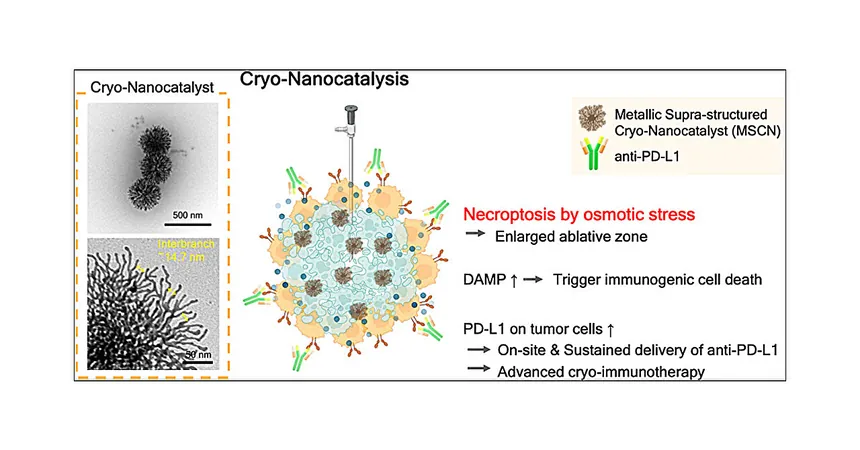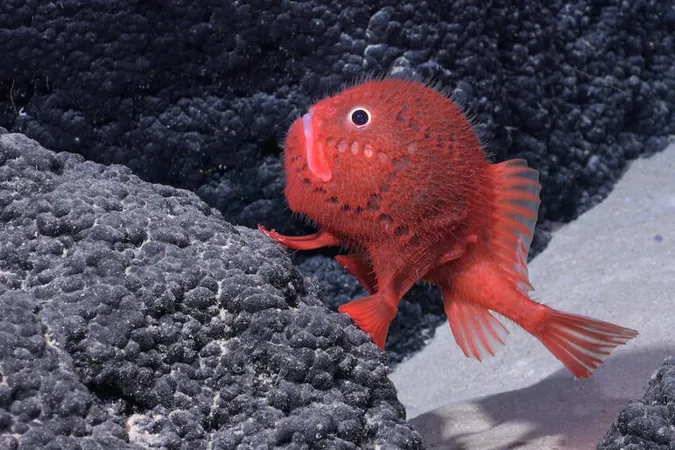
Revolutionizing Cancer Treatment: The Power of Cryoimmunotherapy Just Got Amplified!
2024-09-30
Overview
In a groundbreaking development that promises to reshape cancer treatment, scientists at Northwestern Medicine have unveiled a more effective method for applying cryoimmunotherapy, as detailed in the esteemed journal ACS Nano.
What is Cryoimmunotherapy?
Cryoimmunotherapy fuses immunotherapeutic drugs with extreme cold to obliterate tumor cells, a technique that has shown significant potential in combating cancer. However, drawbacks remain, as noted by Dr. Dong-Hyun Kim, a key researcher and professor in the Division of Basic and Translational Radiology Research at Northwestern University’s Robert H. Lurie Comprehensive Cancer Center.
Challenges of Current Methods
“While cryoablation offers reduced pain and shorter recovery times compared to other ablation methods, challenges persist with achieving consistent ice formation within tumor tissues and activating the immune response against cancer,” Dr. Kim explained.
Innovation with MSCNs
To address these limitations, the team turned to innovative engineered agents known as metallic supra-structured cryo-nanocatalysts (MSCNs). In their pioneering study, researchers first introduced MSCNs into cultured mouse prostate cancer cells. The results were promising: the MSCNs not only raised the freezing point of the tissues, leading to superior ice formation, but also significantly enhanced the anti-cancer immune response, resulting in a higher rate of cell death when compared to conventional cryoablation methods.
Enhanced Effectiveness with PD-L1
Taking things a step further, the team loaded these MSCNs with PD-L1—an immunotherapy protein crucial for stimulating anti-tumor responses. The MSCNs, now armed with PD-L1, were found to be more effective in eliminating tumors and initiating antitumor immune responses in mouse models of prostate cancer than traditional methods of administering PD-L1.
Immune Activation and Future Research
Remarkably, Dr. Kim's research also demonstrated an increase in the activation of CD8+ T-cells, which are vital for identifying and destroying cancer cells. “Our immune characterization and RNA sequencing revealed that memory T-cells—a critical marker of immune memory—could hinder any potential metastasis of the tumor,” he shared. This discovery hints at a promising dual approach, merging immunotherapy with localized ablation therapy.
Looking Ahead
As the research advances, Dr. Kim and his team are set to explore the effectiveness of MSCNs across more cancer models, with an eye towards obtaining FDA approval. If successful, this new frontier in cryoimmunotherapy could not only enhance existing cancer treatments but also pave the way for significant advancements in how we approach oncology.
Conclusion
With cancer remaining one of the leading causes of death globally, this innovative approach raises a glimmer of hope, suggesting that a more effective treatment method might soon be within reach. Stay tuned as this research unfolds—the future of cancer treatment could be just around the corner!




 Brasil (PT)
Brasil (PT)
 Canada (EN)
Canada (EN)
 Chile (ES)
Chile (ES)
 España (ES)
España (ES)
 France (FR)
France (FR)
 Hong Kong (EN)
Hong Kong (EN)
 Italia (IT)
Italia (IT)
 日本 (JA)
日本 (JA)
 Magyarország (HU)
Magyarország (HU)
 Norge (NO)
Norge (NO)
 Polska (PL)
Polska (PL)
 Schweiz (DE)
Schweiz (DE)
 Singapore (EN)
Singapore (EN)
 Sverige (SV)
Sverige (SV)
 Suomi (FI)
Suomi (FI)
 Türkiye (TR)
Türkiye (TR)